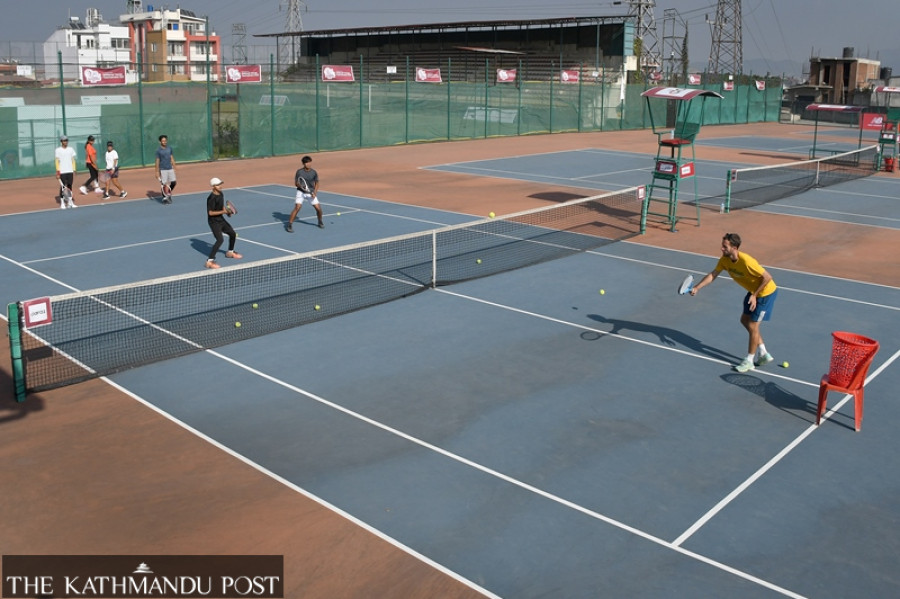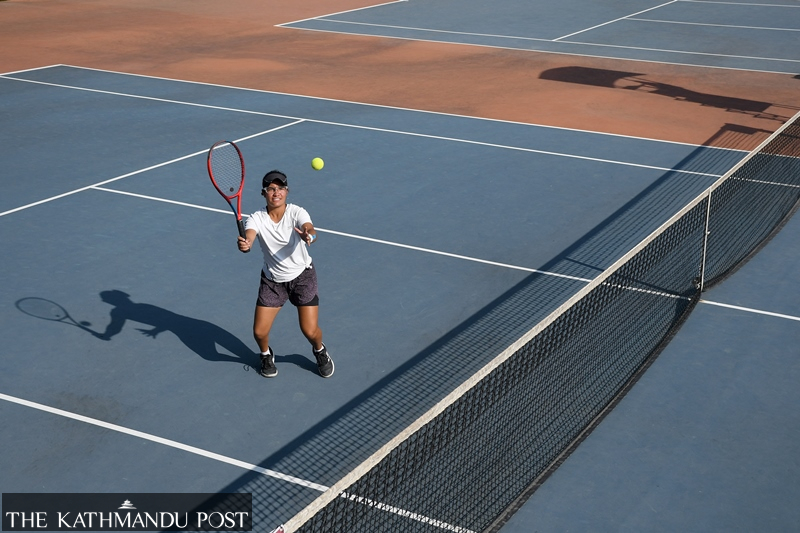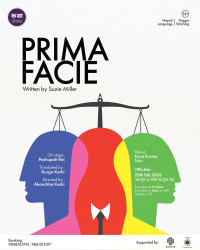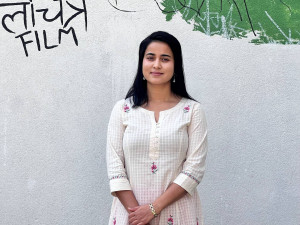Culture & Lifestyle
A Kathmandu tennis school aims to produce ace players
Opened this year, Team Tennis Nepal strives to become the go-to tennis academy for beginners and professional tennis players.
Pinki Sris Rana
Abhilasha Bista was only seven-years-old when she first held a tennis racket. At eighteen, Bista has since been regularly playing competitive tennis and representing Nepal in international tournaments.
Abhilasha was in second grade when she formally started her tennis training. For years, she followed a busy schedule. As soon as she was done with her school, she would rush home and then leave for her tennis training. Once she got home from the training, she would get busy with her studies. But Abhilasha never took her daily routine as a burden.
“After coming home from school, most of my friends utilised the free time they had watching TV or using social media apps. I preferred to spend that time practising tennis," says Abhilasha, who was one of the Nepali players to win bronze in tennis for the first time at the South Asian Games (SAG) 2019.
Abhilasha, who comes from a well-to-do family, credits the rigorous training she received from a very early age for helping her become the professional tennis player she is today.
In a bid to produce many more world-class players like Abhilasha, her father, Ajay Bista, came together with 11 tennis enthusiasts to set up Team Tennis Nepal (TTN), a tennis academy in Dhapakhel in January 2021. The academy hopes not just to provide world-class coaching to young tennis enthusiasts but to also popularise the sport in Nepal.
For Ajay, the idea of starting TTN stemmed from his own experience of taking Abhilasha abroad to get coaching lessons from professionals.
“As parents, we have seen Abhilasha’s potential to become a top tennis player, and to help her reach that stage, we have taken her abroad several times to get lessons from professional coaches because Nepal didn’t have such professional coaches. But it didn’t come cheap with the cost of training, travel, and accommodation,” says Ajay. “So, a few parents of tennis enthusiasts decided to join together and start TTN where professionals could train with a qualified coach and at the same time also provide the necessary infrastructure for beginners to learn from.”
As per the requirements stated by International Tennis Federation (ITF), TTN has six clay courts with four standard rectangular courts 23.77 metres long and 8.23 metres wide and two junior tennis courts, which are almost half the size of the traditional court. All six courts at TTN are clay courts.
“Players practice for long hours before the tournament, and while doing so, there is a very high chance of them stumbling. Unlike concrete courts, players are at a lower risk of serious injuries when practising on clay courts. Since the academy also caters to a lot of young tennis enthusiasts, we took all these factors into account and decided to set up clay courts,” says Ajay. “If our players are participating in tournaments where they are required to compete on concrete courts, we take such players to practise on concrete courts so that they can perform at the top level.”
TTN, says Ajay, is very well aware that to produce world-class tennis players in Nepal, they have to start training children at a very young age. This is why the academy, he says, has made an extra effort to reach out to parents of young tennis enthusiasts and get the children enrolled at TTN.
On any given day at TTN, kids as young as six can be seen learning the basics of tennis.
Six-year-old Iris Shrestha has been training at the academy for the past three months. Her training regime includes six sessions a week, and each training session lasts for an hour and a half. Her mother, Sushma Sharma Shrestha, a nurse by profession, makes sure she accompanies her daughter’s coaching sessions as often as possible.
“During the lockdown, Iris’s classes shifted online, and the number of hours she was spending in front of screens increased drastically,” says Sushma. “To get her into outdoor sports, we got her enrolled here at TTN.”
Sushma thinks that joining the academy has inadvertently fostered positive changes in her daughter. “After joining TTN, not only has our daughter become more physically active, her appetite has also improved. Before joining TTN, she would eat very little, which was a concern for us. She’s also mentally sharper these days,” says Sushma.
Bishwa Bishesh Dallakoti started playing tennis when he was only seven. When TTN opened in January this year Bishwa’s father, Uddhav Dallakoti, also got him enrolled at the academy.
Bishwa, says Ajay, is one of the promising young tennis players at TTN who can go professional.
“He won the in-house junior championship and is a promising athlete. Talent, hard work, and enthusiasm, Bihswa possesses all the qualities to ace in this sport,” says Ajay.
For beginners like Ira and Bishwa, the monthly coaching fee is Rs 10,000, which includes at least an hour of training for six days a week.
“Our beginner’s coaching fee might sound a lot for parents who are not familiar with the sport, but those who know how much such monthly coaching costs will find our fees reasonable. We have kept fees for the beginners as low as possible to get young kids into the sport so that they can develop later on to become professionals,” says Ajay. “For the fee, TTN also provides rackets, balls, an ITF recognized coach, and other necessary infrastructure.”

After the beginners level, one must be trained for a year to upgrade to an intermediate level. The monthly fees for the intermediate level start from Rs 25,000 and go up to Rs 40,000. The training sessions for this level, says Ajay, are much more rigorous. For professional level athletes like Abhilasha, they have to fork out Rs. 60,000 a month for coaching lessons. At this level, the daily training routines are designed to get athletes to train for three to five hours daily.
Another professional tennis player enrolled at TTN is Ira Mehernissa Rawat who won a bronze medal along with Abhilasha for the doubles championship at the South Asian Games (SAG) 2019. At 19, she has already represented Nepal in international tennis competitions. For Rewat, the sport might have started as a hobby, but she is now determined to go all in and pursue the sport to realise her dream of becoming a world-class tennis player.
“I was someone who never liked losing, and losing matches was something I always found frustrating. But having spent so many years playing this sport, it has taught me the importance of accepting defeat but at the same time working hard to prepare myself better,” says Rawat. “This sport has also taught me to remain calm in stressful situations and has made me a stronger person emotionally and mentally.”
Professional tennis players often have to operate in a highly stressful environment, which takes a toll on their mental health. This year, when Naomi Osaka, the first professional Asian tennis player to be ranked No 1 by the Women's Tennis Association, withdrew from the French Open to take care of her mental health, it put the necessary spotlight on discussions surrounding the mental health of athletes.
Since the founding members of TTN are all parents of tennis enthusiasts, the academy, says Ajay, is aware of how important it is to ensure that the enrolled professional athletes get the psychological support they need.
“Once a week, our in-house professional coach who was a player himself runs a psychology class where he shares his own experiences of dealing with defeat and mental health with students,” says Ajay.
For now, the main goal of TTN is to produce athletes good enough to compete at ITF’s annual under 18, Men’s, and Women’s championships. “If the athlete is to win the championship, they can win an amount ranging from $15,000 to $50,000 depending on the championship,” says Ajay.
For Abhilasha, her immediate goal is to win the gold at the next South Asian Games and someday she hopes to play at the Olympics.
“I am determined to achieve my goal, and with my hard work, perseverance, and the world-class coaching I get from TTN, I am very optimistic of fulfilling my tennis dream very soon,” she says.




 16.12°C Kathmandu
16.12°C Kathmandu















